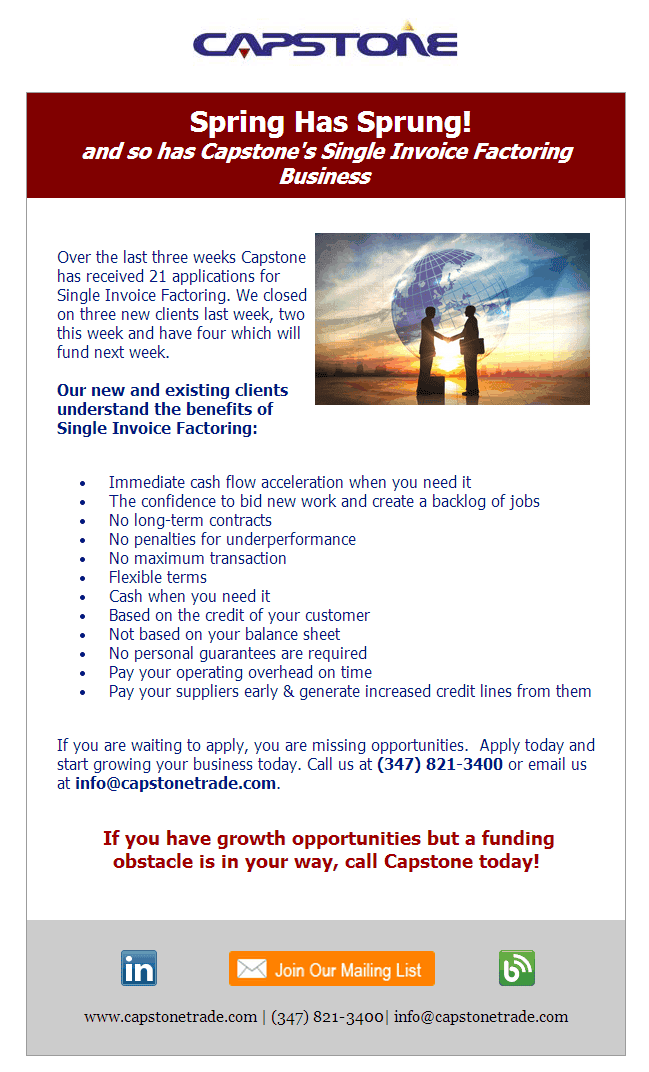Factoring in business refers to the practice of selling accounts receivable at a discount to a third-party factor in order to obtain immediate cash. Factoring allows businesses to meet their immediate cash needs by converting their unpaid invoices into cash.
For example, a small business may sell its outstanding invoices to a factor, who will then collect payment from the customers. This practice provides the business with immediate cash flow and eliminates the need to wait for payment from customers.
Overall, factoring is a financial transaction that helps businesses manage their cash flow effectively.

Credit: www.theprojectgroup.com
Introduction To Factoring In Business
Factoring in business is a financial transaction where a company sells its accounts receivable at a discount to a third party. This allows the company to access immediate cash and meet its present cash needs. An example of factoring in commerce is when a business sells its unpaid invoices to a factor in exchange for cash.
Definition And Explanation
Factoring is a financial transaction and a type of debtor finance in which a business sells its accounts receivable (i.e., invoices) to a third party, known as a factor, at a discount. This allows businesses to convert their unpaid invoices into immediate cash. The factor assumes the responsibility of collecting the payments from the customers.
Benefits Of Factoring
Factoring provides several benefits for businesses, including:
- Improved Cash Flow: By selling their invoices, businesses can receive immediate cash which they can use to cover their operating expenses, purchase inventory, or invest in growth.
- Reduced Risk: Factoring can help businesses mitigate the risk of non-payment and bad debt. The factor assumes the responsibility of collecting payments, reducing the risk of late or non-payment by customers.
- Flexible Financing: Unlike traditional loans, factoring is not based on the creditworthiness of the business but on the creditworthiness of the customers. This makes factoring a viable financing option for businesses with lower credit scores.
- Outsourced Collections: By partnering with a factor, businesses can offload the task of collections and focus on their core operations.
- Growth Opportunities: With improved cash flow and reduced risk, businesses can seize growth opportunities, such as expanding their product lines or entering new markets.
Overall, factoring is a valuable financing tool for businesses looking to improve their cash flow, reduce risk, and focus on growth. It can provide the necessary funds to support day-to-day operations, bridge cash flow gaps, and fuel expansion.

Credit: capstonetrade.com
Real-life Examples Of Factoring In Business
Factoring is a popular financial solution that many businesses use to improve cash flow and address immediate funding needs. By selling their accounts receivable to a third party at a discount, businesses can access the capital they need to meet their financial obligations.
Case Study 1: Company X
Company X, a manufacturing company based in Austin, Texas, was experiencing a cash flow crunch due to delayed payments from its clients. The company had outstanding invoices worth $100,000 but needed cash to cover its operational expenses and fulfill new orders. Instead of waiting for its clients to pay, Company X decided to factor its invoices.
By partnering with a factoring company, Company X sold its invoices at a discounted rate of 90%. This means that the factoring company paid Company X $90,000 upfront. Company X was able to use this immediate cash infusion to pay its suppliers, cover wages, and invest in new machinery. The factoring company then took over the responsibility of collecting the full amount from Company X’s clients.
By factoring its invoices, Company X was able to overcome its cash flow challenges and continue its operations smoothly. The factoring solution provided them with the necessary working capital to sustain business growth and take advantage of new opportunities.
Case Study 2: Company Y
Company Y, a transportation company operating in the United States, faced a similar cash flow problem. The company had a steady stream of clients but struggled with late payments, which affected its ability to pay its drivers and cover fuel costs. To address this issue, Company Y decided to explore factoring as a financing option.
After evaluating different factoring companies, Company Y partnered with a reputable firm that specialized in factoring services for the transportation industry. The factoring company agreed to purchase Company Y’s outstanding invoices at a discount rate of 95%. This meant that Company Y received an upfront payment of $95,000 on its $100,000 worth of invoices.
With the immediate cash injection, Company Y was able to pay its drivers on time, purchase fuel, and maintain its operations efficiently. The factoring company took on the responsibility of collecting payments from Company Y’s clients, allowing the transportation company to focus on growing its business and expanding its fleet.
These real-life examples illustrate how factoring can provide businesses with the financial flexibility and stability they need to thrive. By leveraging factoring services, companies like Company X and Company Y were able to effectively manage their cash flow, meet their obligations, and propel their growth.
How Factoring Works In Commerce
Factoring in business is a financial transaction where a company sells its accounts receivable (invoices) to a third party at a discount. This helps businesses meet their immediate cash needs and is a common example of financial management in commerce.
Process Of Factoring
Factoring is a financial transaction and a type of debtor finance in which a business sells its accounts receivable (i.e., invoices) to a third party (called a factor) at a discount. This process involves three key steps:
- The business sells its invoices to the factor.
- The factor immediately advances a percentage of the invoice value to the business, usually around 80-90%.
- The factor collects the full payment from the customers and deducts their fee before paying the remaining balance to the business.
By factoring their receivables, businesses can gain immediate cash flow to meet their present and immediate cash needs.
Key Players In Factoring
There are three main participants involved in the factoring process:
| Participant | Role |
|---|---|
| Business | Sells its invoices to the factor to gain immediate cash flow. |
| Factor | Purchases the invoices from the business and provides an advance payment. |
| Customers | Make payments for the goods or services directly to the factor. |
The factor takes on the responsibility of collecting payments from the customers and managing the accounts receivable, allowing the business to focus on its operations without worrying about payment collection.
Different Types Of Factoring
Factoring is a crucial aspect of business finance, providing companies with the means to access immediate cash flow by selling their accounts receivable to a third party at a discount. There are different types of factoring available, each with its unique characteristics and benefits.
Recourse Factoring
Recourse factoring is a type of factoring where the business retains the risk of non-payment. In this arrangement, if the customer fails to pay the invoice, the business is responsible for repurchasing the debt from the factor. This type of factoring typically carries lower fees due to the higher risk for the business.
Non-recourse Factoring
Non-recourse factoring shifts the risk of non-payment from the business to the factor. If the customer fails to pay the invoice, the factor absorbs the loss. Although non-recourse factoring often entails higher fees due to the reduced risk for the business, it provides greater protection against bad debt.
Debt Factoring
Debt factoring, also known as invoice discounting, involves businesses using their accounts receivable as collateral to secure a line of credit or short-term loan. This type of factoring allows businesses to access funds quickly for operational needs while avoiding immediate collection challenges.
Choosing The Right Factoring Company
Sure, here’s an engaging section of a blog post about choosing the right factoring company, focusing on the subheading: Choosing the Right Factoring Company. “`htmlWhen it comes to choosing the right factoring company for your business, it’s essential to consider several factors that will impact the smooth functioning of your business operations. From analyzing the rates and terms offered by different factoring companies to understanding their customer service and reputation in the industry, selecting the right partner can significantly impact your business’s growth and stability.
Factors To Consider
Before finalizing a factoring company, there are several vital factors to consider to ensure that the partnership is in the best interest of your business. Some of the factors to consider include:
- Industry experience
- Customer service and support
- Rate structures and fees
- Contract terms and flexibility
- Reputation and track record
Top Factoring Companies
There are several top factoring companies that businesses can consider based on their specific needs and requirements. Some of the top factoring companies in the industry include:
- FundThrough
- Riviera Finance
- eCapital LLC
- Fundbox
- RTS Financial
- Triumph Financial Services LLC
:max_bytes(150000):strip_icc()/ABSOLUTE-ADVANTAGE-FINAL-edit-32a9742eecf944bc870f2de10a452ec5.jpg)
Credit: www.investopedia.com
Frequently Asked Questions Of Example Of Factoring In Business
What Is Factoring With An Example?
Factoring in business is when a business sells its accounts receivable (invoices) to a third party at a discount to meet immediate cash needs. For example, a small business may sell $10,000 worth of invoices to a factor for $9,000, gaining instant access to cash.
What Is Factoring In Business?
Factoring in business is a financial transaction where a company sells its accounts receivable (invoices) to a third party (factor) at a discount. It helps businesses meet their immediate cash needs.
What Is A Real Life Example Of Debt Factoring?
Debt factoring is when a business sells its accounts receivable at a reduced price to meet immediate cash needs. For example, a company may sell its unpaid invoices to a third party at a discount to access immediate funds. This allows the company to manage its cash flow effectively.
What Is The Example Of Factoring In Commerce?
Factoring in commerce is when a business sells its accounts receivable to a third party at a discount to meet immediate cash needs. For example, a company can sell its unpaid invoices to receive immediate cash. This is known as invoice factoring.
Conclusion
Factoring in business can be a valuable financial tool for companies looking to improve cash flow and meet immediate financial needs. By selling their accounts receivable to a third party at a discount, businesses can access cash quickly and efficiently.
This allows them to focus on growth and expansion, rather than being tied up in unpaid invoices. Factoring is a flexible and accessible option for businesses of all sizes, providing a solution to short-term cash flow challenges. Consider exploring factoring as a viable financing option for your business.